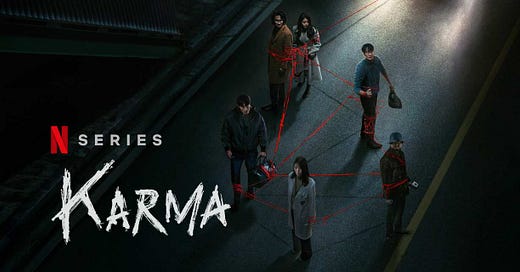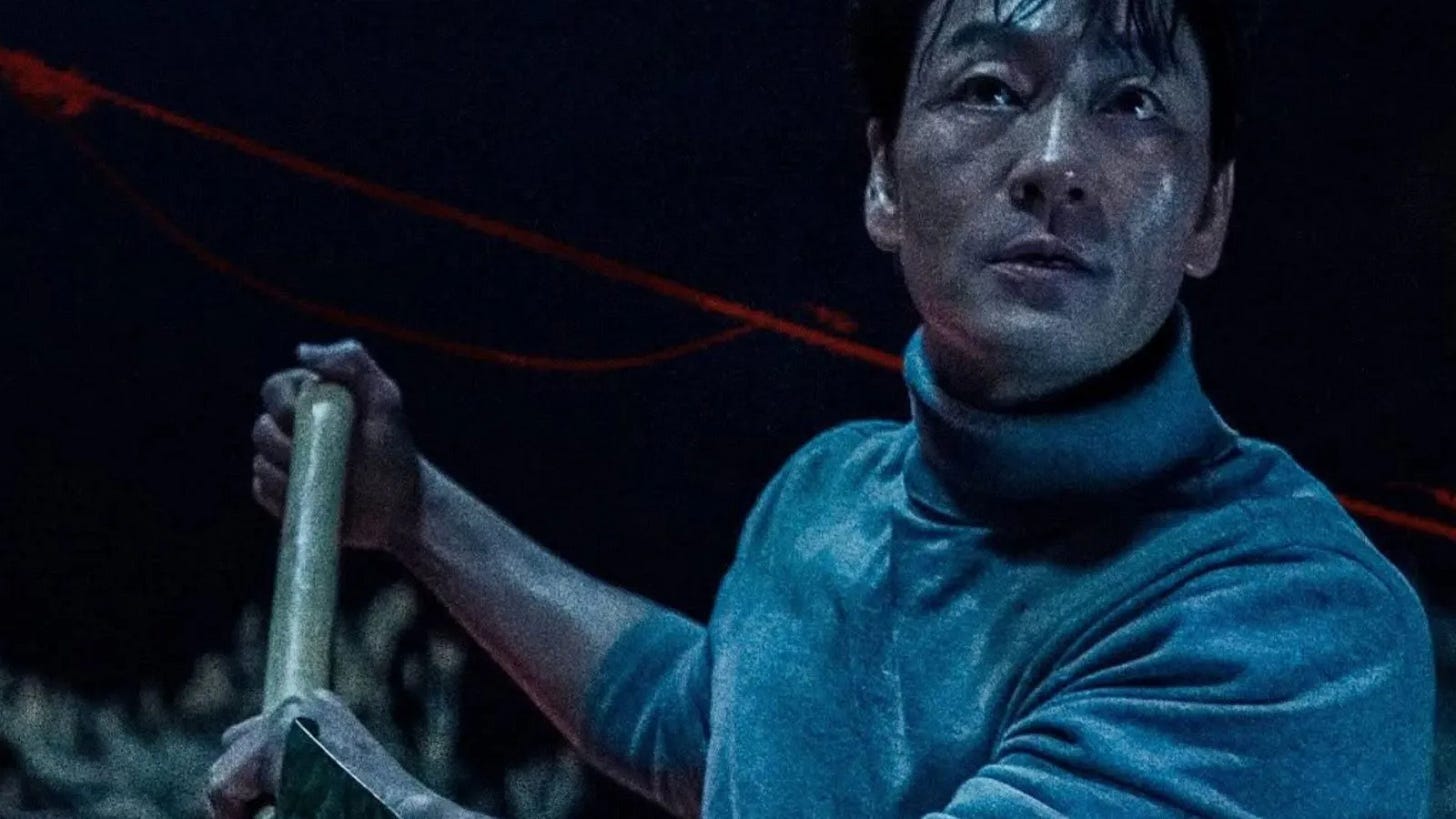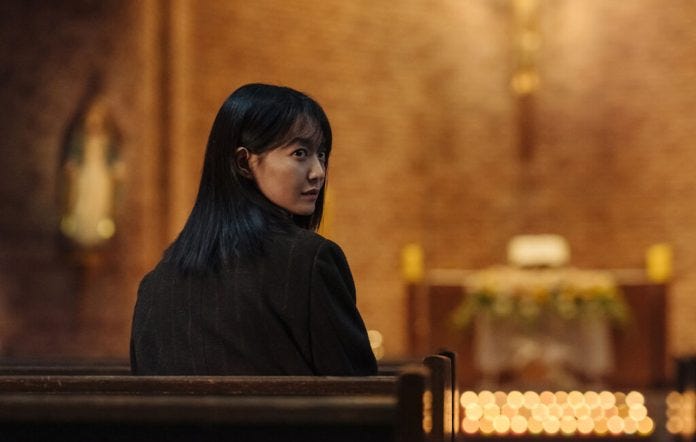Six Corpses, One System: Why Netflix's Karma Is One of the Darkest Shows of 2025
"In a world that rewards cruelty and penalizes weakness, who really deserves to live?"
⚠️ SPOILER ALERT: This analysis contains major plot details and reveals key character fates throughout Netflix's Karma. If you've watched the series, dive right in. If you haven't, you can still follow along—the piece is structured to be understood even without prior viewing, though you'll obviously encounter major spoilers. ⚠️
Netflix's 2025 Korean thriller Karma ("악염") is a six-episode descent into moral darkness, a bleak tale of entangled fates, buried crimes, and systemic violence. Based on Choi Hee-seon's Kakao webtoon, the series follows six characters whose lives intersect through a web of desperation and violence. At its center: a son who kills his father for insurance money. From that single act ripples a tsunami of destruction that engulfs everyone in its path.
The show doesn't ask if people are good or bad. It asks something far more terrifying: What kind of people do systems create? As the title suggests, everyone eventually pays. It's thrilling and thought-provoking in equal measure, but Karma doesn't let us believe in redemption. Instead, it shows a world where the economy has turned human—and traces how one desperate act becomes a plague that consumes everything it touches.
The First Domino: A Father's Death for Insurance Money
The chain of destruction begins with Park Jae-yeong, drowning in debt and pursued by brutal loan sharks. His father, old and sick, can offer neither money nor support. In Jae-yeong's mind, the math makes sense: his father's death means insurance money. Murder becomes just another financial transaction. He embodies the failure of a system that makes the death of a relative more profitable than their life. His crypto dreams and get-rich schemes are mocked as foolish, yet they mimic the speculative ethos of modern finance. When bankers do it, it's called innovation. When Jae-yeong does it, it's desperation.
But desperation requires accomplices. Enter Jang Gil-ryong, a Korean-Chinese ex-gangster trying to live honestly. He's the first to be fired, the first to be cheated, and the easiest to exploit. Living in a gutted bus, scraping together money to support his daughter back home, Gil-ryong represents the system's most disposable element. The system wants cheap labor and no complaints—no severance pay, no rights. Even his criminal past becomes a weapon used against him, first by Jae-yeong who ropes him into the murder plot, then by others who manipulate his desperation. He is the system's discarded weapon—used, broken, and eventually thrown away.
The Expanding Web: When Respectability Meets Violence
The murder sets off a chain reaction that snares Dr. Han Sang-hun, wealthy and respected, having an affair with a beautiful woman. When he stumbles into a hit-and-run that leads to corpse disposal, blackmail, and ultimately his own death, he faces a choice: report the crime or protect the life he already has. He chooses silence, concealment, and eventually complicity. Han represents untested virtue folding under pressure—a man who has never been tested and, when finally tested, discovers his moral center is hollow. He's not driven by gain but by loss aversion, wanting to keep what he has rather than risk it for what's right.
His downfall comes through Lee Yu-jeong, who serves as both seductress and accomplice to the web's true architect. Yu-jeong weaponizes her body and charm, seducing rich married men for blackmail schemes. But her story runs deeper and darker—as a student, jealous of classmate Dr. Lee Ju-yeon, she helped orchestrate her rape. Her motivation isn't poverty or desperation but envy, pride, and a belief that beauty is her only real asset. She gravitates toward predators not out of necessity but affinity, a minor demon who mistakes performance for power.
The Spider at the Center: Pure Predation
Behind Yu-jeong lurks Kim Beom-jun, the show's mastermind and closest embodiment of pure predation. He exploits, blackmails, and kills with surgical precision. He once encouraged Yu-jeong to arrange Dr. Lee's rape. Later, he murders Han, kills Gil-ryong and Jae-yeong, and assumes Jae-yeong's identity to claim insurance money. Beom-jun represents the will to power in its rawest form—unlike the others, he adapts and survives through calculated brutality.
But even predators become prey. In the end, loan sharks mistake him for Jae-yeong, and his organs are harvested by another cold killer. His death brings the narrative full circle—not justice, but symmetry. The system that created him ultimately consumes him, though not through any moral reckoning.
The Ghosts of the Past: Trauma's Long Shadow
The web reaches back decades to encompass Dr. Lee Ju-yeon, gang-raped in high school with Yu-jeong's help. She survives, becomes a doctor, gains success and even love. But trauma fossilizes—she is successful but never free. When she encounters Beom-jun years later (unaware of his true identity), she contemplates revenge. Yet she refrains from killing, Unbeknown to her fate has done it for her. She represents the painful truth that survival is not the same as healing, a ghost trapped in time by wounds that never fully close.
Her boyfriend, Dr. Yoon Jeong-min, provides the narrative's most chilling revelation. A surgeon who saves lives by day and carves them up by night, he moonlights as an organ harvester. His motive is so banal it freezes the blood: buying a house and paying off student loans. Where Beom-jun represents predatory ambition, Yoon embodies something more terrifying—the banality of evil. He is the perfect cog in a sick machine, a bureaucrat of death whose cheerful demeanor masks systematic murder.
The Final Reckoning: A System That Never Pays
As the chain of consequences completes its circuit, every character lies dead or destroyed. Jae-yeong's desperate gamble for insurance money becomes a plague that devours everyone it touches. The immigrant Gil-ryong, exploited and discarded. The respectable Dr. Han, revealed as a coward. The predatory Beom-jun, finally consumed by his own methods. Even the survivors like Dr. Lee carry wounds that will never heal.
Karma calls this justice, but the show exposes it for what it really is: not cosmic balance, but systemic rot. The most radical aspect of the series is its refusal to offer redemption or moral instruction. It simply shows a world where fathers are murdered for money, doctors become organ harvesters, and revenge is just another circuit in an endless loop.
Everyone pays their debts in blood. Everyone except the system itself—it walks away clean, invisible, and untouched. The economy that turns human beings into transactions, that makes death more profitable than life, that discards immigrants and rewards sociopaths—that system faces no reckoning.
Justice in Karma is a row of corpses. Who will pay for the system's crimes?
What did you think of Netflix's Karma? Did the show's bleak worldview resonate with you, or do you see hope where I see only systematic rot? Share your thoughts in the comments below—I'd love to hear how this brutal masterpiece landed with other viewers.







